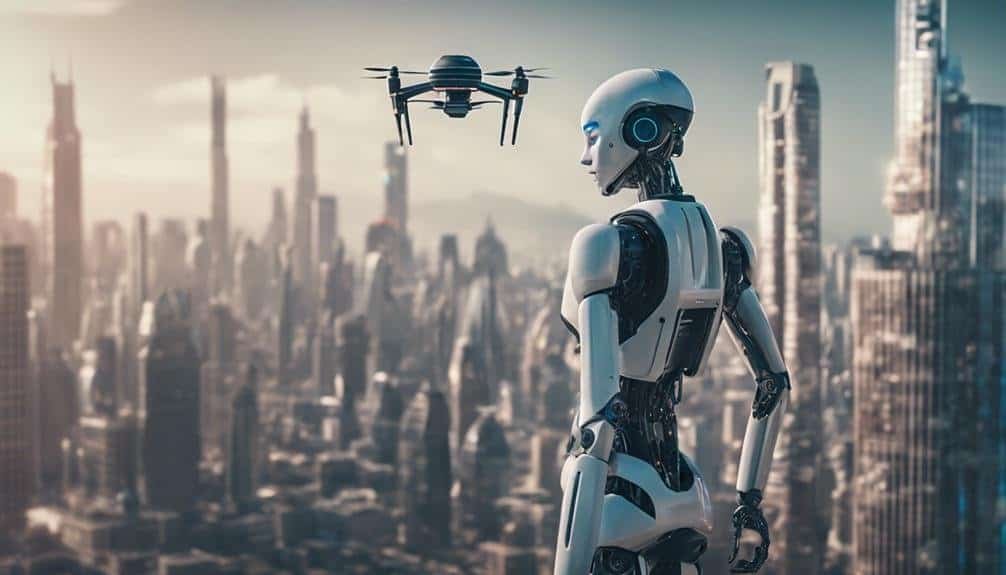The Future of AI: Trends and Predictions
As we navigate the intricate landscape of artificial intelligence, various trends and predictions are shaping the future of this rapidly evolving field.
From the transformative impact of AI in healthcare to the growing importance of ethical AI practices, the potential applications of this technology are vast and multifaceted.
The integration of AI-powered automation, advancements in cybersecurity through AI, and its role in enhancing customer experiences are just a few areas where AI is poised to revolutionize industries.
Moreover, the intersection of AI with education, quantum computing, and sustainable development hints at even more profound implications.
Key Takeaways
- Ethical AI practices drive transparency, accountability, and trust in decision-making.
- AI advancements in education personalize learning, enhance engagement, and streamline assessments.
- AI revolutionizes cybersecurity with proactive threat detection and adaptive defenses.
- Quantum computing integration accelerates AI capabilities for unparalleled innovation and problem-solving.
AI in Healthcare
In the realm of healthcare, the integration of artificial intelligence (AI) technologies has paved the way for transformative advancements in diagnostics, treatment, and patient care. AI in healthcare has revolutionized medical practices by offering innovative solutions that enhance efficiency, accuracy, and overall outcomes.
One of the significant medical advancements facilitated by AI is the development of diagnostic tools that utilize machine learning algorithms to analyze medical images such as X-rays, MRIs, and CT scans. These AI-powered systems can detect patterns and anomalies that may not be easily discernible to the human eye, enabling early and more accurate diagnoses.
Furthermore, AI has also been instrumental in personalized treatment plans through the analysis of vast amounts of patient data to predict individual health risks and responses to specific interventions. This precision medicine approach ensures tailored therapies that are more effective and have fewer side effects.
Ethical AI Practices
Facilitating the responsible deployment of artificial intelligence (AI) involves implementing robust ethical frameworks to ensure transparency and accountability in decision-making processes. Ethical AI practices are essential in mitigating potential harms and ensuring that AI systems operate in a fair and unbiased manner. One key aspect of ethical AI practices is bias detection. Bias in AI systems can lead to discriminatory outcomes, reinforcing existing inequalities. By incorporating bias detection mechanisms, organizations can identify and address biases in datasets and algorithms, thereby promoting fairness and equity.
Moreover, accountability measures play a crucial role in ensuring that AI systems are held responsible for their actions. Establishing clear lines of accountability helps in determining who is responsible for the decisions made by AI systems and the consequences that arise from them. This fosters trust among users and stakeholders, leading to increased acceptance and adoption of AI technologies.
AI-Powered Automation
AI-powered automation is revolutionizing industries by enhancing productivity and streamlining operations through intelligent algorithms and machine learning capabilities.
This transformative technology is enabling businesses to optimize processes, reduce errors, and increase efficiency, ultimately leading to cost savings and improved performance.
As organizations continue to adopt AI-driven automation solutions, the future landscape of work is poised to be reshaped by unprecedented levels of innovation and productivity.
Enhanced Productivity Through AI
With the evolution of artificial intelligence technology, businesses across various industries are experiencing a significant transformation in their operations, driving enhanced productivity through advanced automation processes.
Improved efficiency is a key outcome of integrating AI-powered automation tools into workflows. These technologies streamline repetitive tasks, allowing employees to focus on more strategic and creative aspects of their roles.
Workplace transformation is evident as AI automates mundane activities, leading to a more agile and responsive organizational structure. By leveraging AI to handle routine operations, businesses can achieve higher levels of productivity and accuracy, ultimately fostering a more competitive edge in the market.
The shift towards automation powered by AI is reshaping how work is done, paving the way for a future where human potential is maximized through intelligent technology.
Streamlining Operations With Automation
The integration of automation technologies, particularly those driven by artificial intelligence, is revolutionizing operational processes across industries, optimizing efficiency and paving the way for enhanced productivity.
By leveraging AI-powered automation, businesses can streamline their operations, leading to significant improvements in business efficiency and process optimization. This advanced technology enables the automation of repetitive tasks, allowing employees to focus on more strategic and creative endeavors.
Through machine learning algorithms and predictive analytics, AI can analyze vast amounts of data to identify patterns, optimize workflows, and make real-time decisions.
Ultimately, the seamless integration of AI-powered automation not only enhances operational efficiency but also empowers organizations to stay agile and competitive in today's fast-paced business landscape.
Enhanced Cybersecurity With AI
Utilizing advanced machine learning algorithms, cybersecurity systems can now leverage the capabilities of artificial intelligence to proactively detect and mitigate potential threats. AI defense mechanisms have revolutionized the cybersecurity landscape, enhancing the ability to identify and neutralize complex cyber threats in real-time. This innovative approach to threat detection offers a proactive defense strategy, staying one step ahead of malicious actors. By continuously analyzing vast amounts of data, AI can swiftly identify patterns indicative of a potential breach, enabling rapid response and mitigation actions.
Key Benefits of Enhanced Cybersecurity With AI:
- Early Threat Detection: AI enables the early identification of potential threats, minimizing the impact of cyberattacks.
- Adaptive Security Measures: AI systems can adapt and evolve to counter new and emerging cyber threats effectively.
- Enhanced Incident Response: AI streamlines incident response processes, reducing response times and minimizing damage.
- Improved Data Protection: AI-driven cybersecurity solutions enhance data protection measures, safeguarding sensitive information.
- Proactive Defense Posture: AI empowers organizations to adopt a proactive defense posture, preempting cyber threats before they materialize.
AI in Customer Experience
Harnessing artificial intelligence to enhance customer experience represents a pivotal advancement in modern business strategies. AI in customer experience has transformed the way businesses interact with their clientele. Virtual assistants powered by AI technology streamline customer interactions, providing immediate support and personalized recommendations. Personalization algorithms analyze customer data to offer tailored experiences, increasing customer satisfaction and loyalty.
| Advantages of AI in Customer Experience |
|---|
| 1. Efficiency: Virtual assistants handle multiple customer queries simultaneously. |
| 2. Personalization: Algorithms customize recommendations based on individual preferences. |
| 3. 24/7 Availability: AI ensures round-the-clock customer support. |
Implementing virtual assistants and personalization algorithms not only improves customer satisfaction but also optimizes operational efficiency. Businesses that leverage AI in customer experience gain a competitive edge by offering enhanced services tailored to individual needs. As AI continues to evolve, its role in customer experience will deepen, leading to more seamless and personalized interactions.
AI in Education
In the realm of education, artificial intelligence is revolutionizing traditional learning methods through its innovative applications and adaptive technologies. AI in education is paving the way for personalized learning experiences and more effective adaptive assessments. By leveraging AI, educational institutions can tailor learning paths to individual student needs, providing a more engaging and efficient educational journey.
Key Impacts of AI in Education:
- Personalized Learning: AI algorithms analyze student behavior and performance to create customized learning experiences.
- Adaptive Assessments: AI-powered assessments adjust difficulty levels based on students' responses, ensuring accurate evaluation.
- Engagement: Interactive AI tools like chatbots and virtual tutors enhance student engagement and motivation.
- Efficiency: Automated grading and feedback systems save educators time, allowing them to focus on personalized teaching.
- Data-Driven Insights: AI generates valuable insights from student data, enabling educators to make informed decisions for continuous improvement.
Quantum Computing and AI
The convergence of quantum computing and AI holds immense potential to revolutionize various fields.
From enabling faster and more efficient algorithms to tackling complex problems that classical computers struggle with, the synergy of quantum computing and AI opens up new horizons for innovation.
As the capabilities of both technologies continue to advance, the development of AI applications that harness the power of quantum computing is set to redefine the boundaries of what is possible in the realm of artificial intelligence.
Quantum AI Potential
Exploring the synergy between quantum computing and artificial intelligence reveals a realm of unprecedented computational power and potential for groundbreaking advancements. Quantum AI advancements hold the key to unlocking a future where:
- Limitless Possibilities: Quantum AI opens doors to new possibilities previously deemed unattainable.
- Revolutionizing Industries: Future applications of Quantum AI are poised to revolutionize industries across the board.
- Unprecedented Speed: The fusion of quantum computing and AI promises unparalleled processing speeds.
- Enhanced Problem-Solving: Quantum AI advancements offer enhanced problem-solving capabilities beyond traditional AI.
- Transformative Innovations: The marriage of quantum computing and AI is set to drive transformative innovations with far-reaching implications.
AI Quantum Applications
The synergy between quantum computing and artificial intelligence has paved the way for a new frontier in computational capabilities known as AI Quantum Applications.
Quantum AI advancements are reshaping the landscape of artificial intelligence by leveraging the unique properties of quantum systems to enhance machine learning algorithms, optimization processes, and data analysis.
These AI quantum capabilities offer the potential for exponential acceleration in solving complex problems that traditional computers struggle with, such as drug discovery, financial modeling, and cryptography.
As quantum computing continues to evolve, the integration of AI algorithms with quantum systems is poised to revolutionize various industries, opening up possibilities for faster, more efficient computations and groundbreaking discoveries that were previously unattainable with classical computing methods.
AI in Sustainable Development
Within the realm of sustainable development, Artificial Intelligence (AI) emerges as a transformative force reshaping traditional approaches. AI in sustainable development leverages advanced algorithms to drive innovations that benefit the environment and society. Here are some ways AI is making a difference:
- Optimizing Energy Consumption: AI is used to analyze patterns and optimize energy consumption, leading to reduced waste and increased efficiency.
- Enhancing Renewable Energy: AI assists in maximizing the efficiency of renewable energy sources like solar and wind power, promoting the adoption of green technology.
- Monitoring Environmental Impact: AI tools monitor and analyze data to assess and mitigate the environmental impact of human activities.
- Improving Waste Management: AI solutions optimize waste management processes, leading to better recycling and reduced pollution.
- Enabling Precision Agriculture: AI technologies help farmers optimize crop yields, reduce resource wastage, and promote sustainable farming practices.
Through these applications, AI is driving significant progress towards a more sustainable future, where technology plays a vital role in addressing environmental challenges.
Conclusion
In conclusion, the future of AI is poised to revolutionize various industries such as healthcare, cybersecurity, customer experience, education, and sustainable development.
As we embrace the advancements in AI technology, we can expect to witness a transformative shift in how we approach complex problems and tasks.
The potential of AI to enhance efficiency and effectiveness in these sectors is like a beacon of light guiding us towards a brighter and more innovative future.







